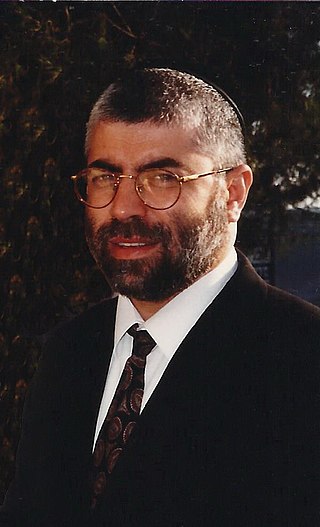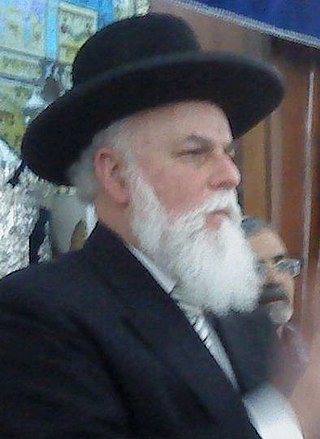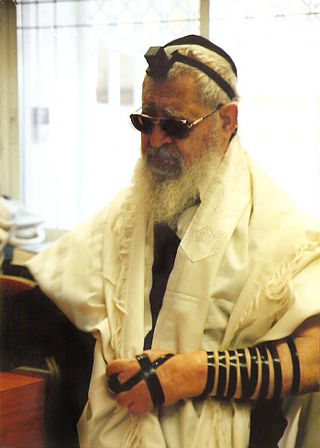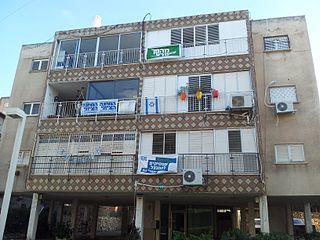
Kol BaRama is a Haredi Israeli radio station established in 2009. The station, based in Bnei Brak, broadcasts seven days a week, but not on Shabbat (from sunset Friday afternoon until nightfall Saturday night)

Kol BaRama is a Haredi Israeli radio station established in 2009. The station, based in Bnei Brak, broadcasts seven days a week, but not on Shabbat (from sunset Friday afternoon until nightfall Saturday night)
| Frequency | Region |
|---|---|
| 92.1 FM | Central area |
| 105.7 FM | Jerusalem |
| 104.3 FM | South |
The station is now closely identified with Aryeh Deri's Shas party. From 2005 until 2010 the party supported Shas' rival Eli Yishay.
During the 2020 COVID-19 pandemic, when all synagogues in Israel were closed, the station received permission to broadcast daily prayers with a minyan 3 times a day.

United Torah Judaism, often referred to by its electoral symbol Gimel, is a Haredi, religious conservative political alliance in Israel. The alliance, consisting of Agudat Yisrael and Degel HaTorah, was first formed in 1992, in order to maximize Ashkenazi Haredi representation in the Knesset. Despite the alliance splitting in 2004 over rabbinical differences, the parties reconciled in 2006, in order to prevent vote-wasting. In April 2019, the party achieved its highest number of seats ever, receiving eight seats.
Shas is a Haredi religious political party in Israel. Founded in 1984 under the leadership of Rabbi Ovadia Yosef, a former Israeli Sephardi chief rabbi, who remained its spiritual leader until his death in October 2013, it primarily represents the interests of Sephardic and Mizrahi Haredi Jews.

Eliyahu "Eli" Yishai is an Israeli politician. A former leader of Shas, he represented the party in the Knesset from 1996 until 2015, also holding several ministerial posts, including being Deputy Prime Minister, Minister of Internal Affairs, and Minister of Industry, Trade, and Labor. In December 2014, he left Shas to establish the Yachad party.
Elections in Israel are based on nationwide proportional representation. The electoral threshold is currently set at 3.25%, with the number of seats a party receives in the Knesset being proportional to the number of votes it receives. The Knesset is elected for a four-year term, although most governments have not served a full term and early elections are a frequent occurrence. Israel has a multi-party system based on coalition governments as no party has ever won a majority of seats in a national election, although the Alignment briefly held a majority following its formation by an alliance of several different parties prior to the 1969 elections. Suffrage is universal to all Israeli citizens above the age of 18. Israeli citizens living abroad have to travel to Israel in order to vote. Voting booths are made available on Israeli ships. Elections are overseen by the Central Elections Committee, and are held according to the Knesset Elections Law. Israel was ranked 47th most electoral democratic country in the world and the most electoral democratic country in the Middle East according to V-Dem Democracy indices in 2023.

Aryeh Makhlouf Deri, also Arie Deri, Arye Deri, or Arieh Deri, is an Israeli politician and one of the founders of the Shas political party who served as the Vice Prime Minister, Minister of Health, and Minister of the Interior and Periphery under Prime Minister Benjamin Netanyahu from December 2022 to January 2023. Previously he served as the Minister of the Interior, Minister of the Development of the Negev and Galilee, Minister of the Economy, as well as a member in the Security Cabinet of Israel.

Shlomo Benizri is an Israeli politician and member of the Shas party. He represented Shas in the Knesset between 1992 and 2008, serving as Deputy Health Minister, Minister of Health, and Labor and Social Welfare Minister during the late 1990s and early 2000s. He was later convicted for accepting bribes, breach of trust, conspiring to commit a crime, and obstruction of justice, and served a prison sentence.

Army Radio or Galei Tzahal, known in Israel by its acronym Galatz, is a nationwide Israeli radio network operated by the Israel Defense Forces. The station broadcasts news, music, traffic reports and educational programs to the general public as well as entertainment and military news magazines for soldiers. The network has one main station and an offshoot - Galgalatz - that broadcasts music and traffic reports 24 hours a day in Hebrew. The staff includes both soldiers and civilians. As of December 2013, the station is no longer broadcast via shortwave to Europe. There is still a livestream feed on the internet. After the 2023 Israel-Hamas war, they began using the former frequency of 1287KHZ and 945KHZ as it can reach to the bomb shelters and other areas in Israel.
Moria was a short-lived one-man political party in Israel between 1990 and 1992.

Rabbi Yitzhak Haim Peretz is a former Israeli politician who held several ministerial portfolios during the 1980s and early 1990s.

Sephardic Haredim are Jews of Sephardi and Mizrahi descent who are adherents of Haredi Judaism. Sephardic Haredim today constitute a significant stream of Haredi Judaism, alongside the Hasidim and Lita'im. An overwhelming majority of Sephardic Haredim reside in Israel, where Sephardic Haredi Judaism emerged and developed. Although there is a lack of consistency in many of the statistics regarding Haredim in Israel, it is thought that some 20% of Israel's Haredi population are Sephardic Haredim. This figure is disputed by Shas, which claims that the proportion is "much higher than 20%", and cites voting patterns in Haredi cities to support its position.
Early legislative elections were held in Israel on 22 January 2013 to elect the 120 members of the nineteenth Knesset. Public debate over the Tal Law had nearly led to early elections in 2012, but they were aborted at the last moment after Kadima briefly joined the government. The elections were later called in early October 2012 after failure to agree on the budget for the 2013 fiscal year.

Early elections for the twentieth Knesset were held in Israel on 17 March 2015. Disagreements within the governing coalition, particularly over the budget and a "Jewish state" proposal, led to the dissolution of the government in December 2014. The Labor Party and Hatnuah formed a coalition, called Zionist Union, with the hope of defeating the Likud party, which had led the previous governing coalition along with Yisrael Beiteinu, Yesh Atid, The Jewish Home, and Hatnuah.
Moetzet Chachmei HaTorah is the rabbinical body that has the ultimate authority in the Israeli ultra-Orthodox Sephardic and Mizrahi Shas Party.
Politics in Israel are dominated by Zionist parties. They traditionally fall into three camps, the first two being the largest: Labor Zionism, revisionist Zionism, and religious Zionism. There are also several non-Zionist Orthodox religious parties and non-Zionist secular left-wing groups, as well as non-Zionist and anti-Zionist Israeli Arab parties.

Yachad is an Orthodox Jewish political party in Israel formed by former Shas member Eli Yishai. The party combines certain groups of ultra-Orthodox Jews with some religious Zionists.
In Israeli politics, the national camp or right-wing bloc is an informal coalition of nationalist and right-wing, religious conservative political parties that since 1977 has frequently co-operated to form governments.
Snap legislative elections were held in Israel on 17 September 2019 to elect the 120 members of the 22nd Knesset. Following the previous elections in April, incumbent Prime Minister Benjamin Netanyahu failed to form a governing coalition for a second consecutive time. On 30 May, the Knesset voted to dissolve itself and trigger new elections, in order to prevent Blue and White party leader Benny Gantz from being appointed Prime Minister-designate. This election marked the first time the Knesset voted to dissolve itself before a government had been formed.

The Secular Right is a hiloni political party in Israel. It was formed by Tiberias mayor Ron Cobi in June 2019.

Moshe Abutbul is an Israeli politician. He serves as the Deputy minister of the Israeli Ministry of Agriculture and Rural Development, and has been elected to the Knesset since 2019. From 2008 until 2018, he served as the mayor of Beit Shemesh.
The Unorthodox is a 2018 Israeli film depicting the establishment of the Shas political party. The protagonist, Yaakov Cohen, is driven to form a religious political party representing the interests of Sephardic Jews. The incident that drives Cohen is the expulsion of his daughter Heli from a Bais Yaakov school, owing to her Sephardic background.